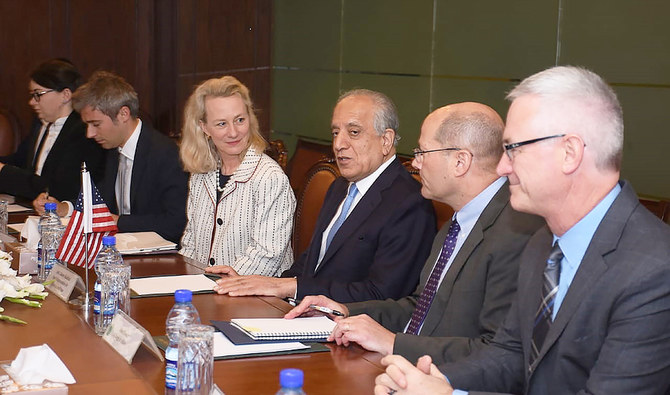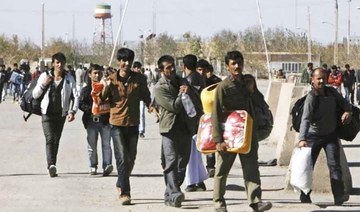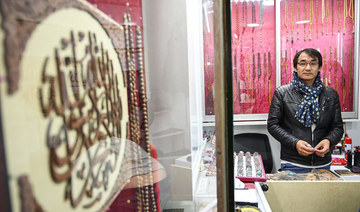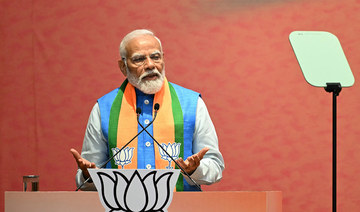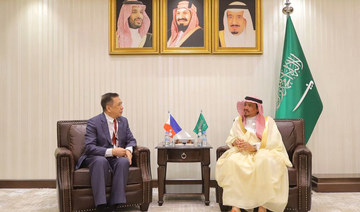KABUL: US Assistant Secretary of State Alice Wells on Monday emphasized the need for free and timely presidential elections in Afghanistan as the fate of Washington’s talks with the Taliban remained uncertain.
The election, slated for Sept. 28, has been delayed twice, partly because of Washington’s insistence on allowing its closed-door negotiations with the Taliban to succeed so that the militants can participate in the vote while US President Donald Trump insists on pulling American troops out of Afghanistan.
Wells on Sunday discussed the peace process and the polls with President Ashraf Ghani and Chief Executive Dr. Abdullah Abdullah, who share power in the National Unity Government as part of a deal brokered by the US following the fraudulent presidential elections of 2014.
She held separate meetings on Monday with officials of government-appointed election commissions, according to a statement issued by the US embassy.
“She stressed the importance of a transparent, credible election process, of making swift preparations to complete voter registration, and hiring and training the staff needed to conduct the elections in a timely manner,” the statement read.
Conducting elections under the current government is seen as controversial, given that the political parties and Ghani’s rivals — who are standing against his re-election — do not believe that the divided and weak administration will be capable of holding the vote freely after the disorganized parliamentary polls in October.
The government could not hold the parliamentary polls in one province due to poor security measures.
The results for Kabul province have not been announced yet, with parliamentary nominees routinely holding anti-government protests in various parts of the country.
Some foreign donors who bankrolled the parliamentary elections have shown a reluctance to contribute to presidential elections after the scandal that took place during the vote.
Wells’ trip comes a week after the sixth round of talks between delegates of Taliban and US Special Envoy for Afghanistan Zalmay Khalilzad ended abruptly in Qatar hours after the Taliban staged a brazen commando-style attack on a US-funded group in Kabul, resulting in the deaths of at least nine people.
During her trip, Wells is set to meet with men and women from civil society to hear their views on peace and reaffirm US support for a peaceful, stable Afghanistan, the US embassy statement added.
In her meeting with Ghani on Sunday, Wells also discussed the US-Afghan Civilians Assistance Review to promote strong governance and self-reliance as proposed by Ghani in his letter to Trump, as well as other issues related to Afghanistan, presidential palace officials said.
It was not immediately clear if she would meet with opposition figures and rivals of Ghani standing against the incumbent for his re-election.
Ghani’s rivals, who accuse the president of using government resources in his election campaign, want him to quit office when his term — on the basis of the constitution — ends in one week’s time.
They have been pushing for the formation of an interim government while Ghani, through a ruling of the Supreme Court, says he will remain in office until the polls are held.
Ghani’s rivals have warned of massive protests should he not leave office after one week.
Ahmad Saeedi, a political analyst, told Arab News that Wells had come to Kabul to evaluate Washington’s ties with Ghani.
“Americans feel badly hurt by the Taliban’s attack in Kabul and for now seem to have halted the talks with the Taliban. The US deputy foreign minister has come to reassess ties with Ghani to find out what Washington can do and what Ghani can do to find an understanding,” Saeedi said.
Adviser Hamdullah Mohib, several months ago in Washington publicly accused the Afghan-born Khalilzad of acting like a viceroy, alleging that he harbored ambitions to lead an interim government in Afghanistan.
Akbar Polad, another observer, said that holding the elections was now top of the agenda in Washington.
“There seems to be a change in the view of Americans and now they give credibility to convocation of the elections. We all know that there are shortcomings, but we cannot reverse to 20 years back and all seem to agree that elections are the only way for putting an end to the crisis,” he told Arab News.



